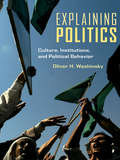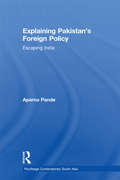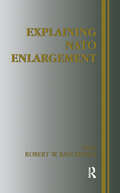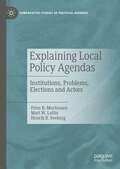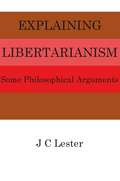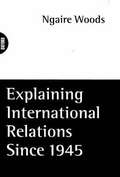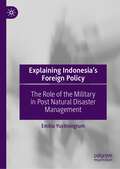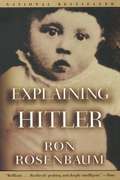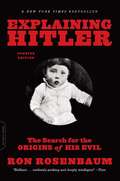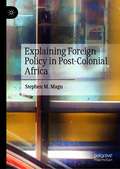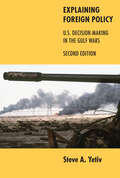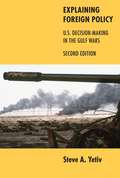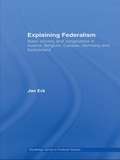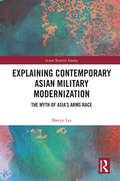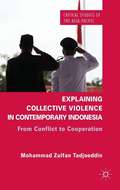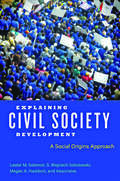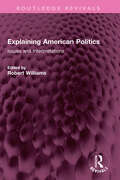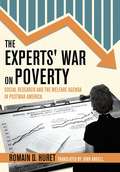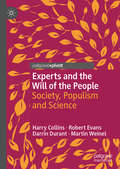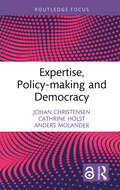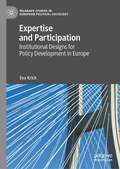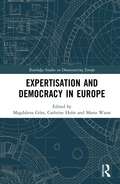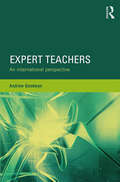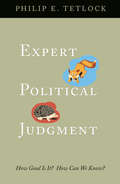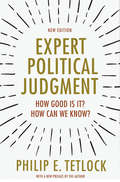- Table View
- List View
Explaining Politics: Culture, Institutions, and Political Behavior
by Oliver WoshinskyThis unique text offers a comprehensive overview of who participates in politics and why, how social and political institutions shape that involvement, and, ultimately, what form citizen political participation takes. Drawing on a multitude of factors to explain politics and political behaviour, Woshinsky shows that political outcomes depend on a complex interplay between individuals and their environment. Psychology, personality, and ideology, together with culture, institutions, and social context shape political behaviour. Explaining Politics offers a wealth of comparative examples and practical applications through a lively and engaging narrative.
Explaining Pakistan's Foreign Policy: Escaping India (Routledge Contemporary South Asia Series)
by Aparna PandePakistan has over the decades become a hotbed for the terrorist ideology often referred to as Jihadism. This book investigates the underlying principles of Pakistan’s foreign policy from 1947 until the present day, and explains the rise of Jihadism as an offshoot of Pakistan’s security concerns. The book goes on to discuss that from its inception as a separate state, Pakistan’s foreign policy focused on ‘seeking parity’ with India and ‘escaping’ from an Indian South Asian identity. The desire to achieve parity with its much larger neighbour led Pakistan to seek the assistance and support of allies. The author analyses the relationship Pakistan has with Afghanistan, United States, China and the Muslim world, and looks at how these relationships are based on the desire that military, economic and diplomatic aid from these countries would bolster Pakistan’s meagre resources in countering Indian economic and military strength. The book presents an interesting contribution to South Asian Studies, as well as studies on International Relations and Foreign Policy.
Explaining NATO Enlargement
by Robert W. RauchhausThis work evaluates the pros and cons of NATO enlargement. It explains why NATO offered membership to three of its Cold War adversaries and makes recommendations about which countries, if any, should be offered membership in the future.
Explaining Local Policy Agendas: Institutions, Problems, Elections and Actors (Comparative Studies of Political Agendas)
by Peter B. Mortensen Matt W. Loftis Henrik B. SeebergBuilding on hundreds of thousands of systematically collected and content-coded local policy agenda observations, this book examines – theoretically and empirically - the policy agenda effects of four central aspects of any political system: the institutions that structure politics; the problems confronting the political system; the occurrence of regular and free elections; and the actors navigating the political system. Developing an explanatory model based on these four factors not only improves our understanding of the determinants of the local policy agenda but also contributes to a further integration of local government research, policy agendas research, and the broader discipline of political science. The book may be of particular interest to scholars and students of comparative politics, agenda setting, public policy, and local government.
Explaining Libertarianism: Some Philosophical Arguments
by J. C. LesterExplaining Libertarianism: four theses: 1. Interpersonal liberty requires an explicit, pre-propertarian, purely factual, theory. 2. Liberty is and need only be morally desirable in systematic practice, not in every logically possible case. In practice, there is no clash between the two main moral contenders: rights and consequences. 3. Nothing can ever justify, support or ground any theory of liberty or its applications because it is logically impossible to transcend assumptions. Theories can only be explained, criticised and defended within conjectural frameworks. 4. The state is inherently authoritarian and also negative-sum. It reduces welfare overall, with the losses compounding over time. Libertarian anarchic order is the positive-sum solution to illiberal political chaos. J C Lester is a philosopher of libertarianism. He has written widely on the subject in books, articles and dialogues. His solution to the crucial philosophical problem of interpersonal liberty provides an explicit theory of liberty and explains how its application entails self-ownership and external property, and relates to all other interpersonal matters.
Explaining International Relations Since 1945
by Ngaire WoodsThe book is a collection of 16 articles on international relations by leading authors in the field. It discusses new theoretical concepts with numerous examples taken from world events. The effectiveness of the UN, NATO, SEATO, the EEC, etc. is discussed in detail.
Explaining Indonesia’s Foreign Policy: The Role of the Military in Post Natural Disaster Management
by Emilia YustiningrumThis book examines Indonesia’s post-Aceh tsunami disaster management through the lens of a multifaceted foreign policy decision-making process involving a variety of bureaucratic actors. It argues that organizational structure and bargaining aspects are as important as power and interests in explaining foreign policy making in the Indonesian context. When the Aceh tsunami struck in late 2004, the use of foreign military assets in responding to natural disasters was not a common feature in Indonesian history—Jakarta remained reticent to engage foreign military enclaves within its own territories. This greatly affected Indonesia’s security cooperation with other countries, including Australia. Prior to the Aceh tsunami, natural disaster management was a domestic political issue. The unprecedented decision by the government of Susilo Bambang Yudhoyono to approve foreign military assistance for military operations other than war (MOOTW) in Aceh was a result of domestic and international factors. This book addresses timely yet fundamental questions about Indonesian foreign policy decision making that led to the involvement of foreign militaries in the country’s worst-ever natural disaster. As a former colony that prized the value of non-interference, the Indonesian government had to make a difficult decision about whether to accept offers of international assistance from countries including Australia. With this, the book explores why the Indonesian government decided to approve Australian humanitarian assistance following the 2004 Aceh tsunami, and how governmental agencies managed this assistance.
Explaining Hitler: The Search for the Origins of His Evil
by Ron RosenbaumDocuments a variety of authors' takes on the reasons behinds Hitler's actions.
Explaining Hitler: The Search for the Origins of His Evil, updated edition
by Ron RosenbaumIn Explaining Hitler, Ron Rosenbaum investigates the meanings and motivations people have attached to Hitler and his crimes against humanity. What does Hitler tell us about the nature of evil? In often dramatic encounters, Rosenbaum confronts historians, scholars, filmmakers, and deniers as he skeptically analyzes the key strains of Hitler interpretation. A balanced and thoughtful overview of a subject both frightening and profound, this is an extraordinary quest, an expedition into the war zone of Hitler theories, "a provocative work of cultural history that is as compelling as it is thoughtful, as readable as it is smart” (New York Times). First published in 1998 to rave reviews, Explaining Hitler became a New York Times-bestseller. This new edition is an update of that classic and a critically important contribution to the study of the twentieth century’s darkest moment.
Explaining Foreign Policy in Post-Colonial Africa
by Stephen M. MaguThis book explores foreign policy developments in post-colonial Africa. A continental foreign policy is a tenuous proposition, yet new African states emerged out of armed resistance and advocacy from regional allies such as the Bandung Conference and the League of Arab States. Ghana was the first Sub-Saharan African country to gain independence in 1957. Fourteen more countries gained independence in 1960 alone, and by May 1963, when the Organisation of African Unity (OAU) was formed, 30 countries were independent. An early OAU committee was the African Liberation Committee (ALC), tasked to work in the Frontline States (FLS) to support independence in Southern Africa. Pan-Africanists, in alliance with Brazzaville, Casablanca and Monrovia groups, approached continental unity differently, and regionalism continued to be a major feature. Africa’s challenges were often magnified by the capitalist-democratic versus communist-socialist bloc rivalry, but through Africa’s use and leveraging of IGOs – the UN, UNDP, UNECA, GATT, NIEO and others – to advance development, the formation of the African Economic Community, OAU’s evolution into the AU and other alliances belied collective actions, even as Africa implemented decisions that required cooperation: uti possidetis (maintaining colonial borders), containing secession, intra- and inter-state conflicts, rebellions and building RECs and a united Africa as envisioned by Pan Africanists worked better collectively.
Explaining Foreign Policy: U.S. Decision-Making in the Gulf Wars
by Steve A. YetivSteve A. Yetiv has developed an interdisciplinary, integrated approach to studying foreign policy decisions, which he applies here to understand better how and why the United States went to war in the Persian Gulf in 1991 and 2003. Yetiv’s innovative method employs the rational actor, cognitive, domestic politics, groupthink, and bureaucratic politics models to explain the foreign policy behavior of governments. Drawing on the widest set of primary sources to date—including a trove of recently declassified documents—and on interviews with key actors, he applies these models to illuminate the decision-making process in the two Gulf Wars and to develop theoretical notions about foreign policy. What Yetiv discovers, in addition to empirical evidence about the Persian Gulf and Iraq wars, is that no one approach provides the best explanation, but when all five are used, a fuller and more complete understanding emerges.Thoroughly updated with a new preface and a chapter on the 2003 Iraq War, Explaining Foreign Policy, already widely used in courses, will continue to be of interest to students and scholars of foreign policy, international relations, and related fields.
Explaining Foreign Policy: U.S. Decision-Making in the Gulf Wars
by Steve A. YetivSteve A. Yetiv has developed an interdisciplinary, integrated approach to studying foreign policy decisions, which he applies here to understand better how and why the United States went to war in the Persian Gulf in 1991 and 2003. Yetiv's innovative method employs the rational actor, cognitive, domestic politics, groupthink, and bureaucratic politics models to explain the foreign policy behavior of governments. Drawing on the widest set of primary sources to date-including a trove of recently declassified documents-and on interviews with key actors, he applies these models to illuminate the decision-making process in the two Gulf Wars and to develop theoretical notions about foreign policy. What Yetiv discovers, in addition to empirical evidence about the Persian Gulf and Iraq wars, is that no one approach provides the best explanation, but when all five are used, a fuller and more complete understanding emerges. Thoroughly updated with a new preface and a chapter on the 2003 Iraq War, Explaining Foreign Policy, already widely used in courses, will continue to be of interest to students and scholars of foreign policy, international relations, and related fields.
Explaining Federalism: State, society and congruence in Austria, Belgium, Canada, Germany and Switzerland (Routledge Studies in Federalism and Decentralization #Vol. 17)
by Jan ErkThis book deals with the theoretical and empirical questions of federalism in the context of five case studies: Austria, Belgium, Canada, Germany and Switzerland. The central argument is that in the long run the political institutions of federalism adapt to achieve congruence with the underlying social structure. This change could be in the centralist direction reflecting ethno-linguistic homogeneity, or in decentralist terms corresponding to ethno-linguistic heterogeneity. In this context, the volume: fills a gap in the comparative federalism literature by analyzing the patterns of change and continuity in five federal systems of the industrial west, this is done by an in-depth empirical examination of the case studies through a single framework of analysis illustrates the shortcomings of new-institutionalist approaches in explaining change, highlighting the usefulness of society-based approaches in studying change and continuity in comparative politics. Explaining Federalism will be of interest to students and scholars of federalism, comparative government, comparative institutional analysis and comparative public policy.
Explaining Contemporary Asian Military Modernization: The Myth of Asia’s Arms Race (Asian Security Studies)
by Sheryn LeeThis book proposes a novel theoretical framework of "interactive arming" in order to explain armament dynamics in contemporary Asia. Frequently, the modernisation of contemporary naval forces in Asia is described as an "arms race," with the underlying assumption being that weapons acquisitions and increases in defence expenditure are competitive and bilateral and due to conflicting purposes or mutual fears. This book argues that the concept of an arms race is an unsuitable one for explaining contemporary military modernisation in 21st-century Asia. Instead, it proposes a novel and innovative concept of "interactive arming" and argues that what drives conflict is political rivalry, not weapons acquisitions. Instead of perceiving arming as abnormal behaviour, the book views arming as a natural strategic behaviour of states and military modernisation as a basic requirement for a state’s ability to survive. This book will be of much interest to students of Asian security, strategic studies and international relations in general.
Explaining Collective Violence in Contemporary Indonesia: From Conflict To Cooperation (Critical Studies of the Asia-Pacific)
by Mohammad TadjoeddinExplaining Civil Society Development: A Social Origins Approach
by Lester M. Salamon S. Wojciech Sokolowski Megan A. HaddockHow historically rooted power dynamics have shaped the evolution of civil society globally.The civil society sector—made up of millions of nonprofit organizations, associations, charitable institutions, and the volunteers and resources they mobilize—has long been the invisible subcontinent on the landscape of contemporary society. For the past twenty years, however, scholars under the umbrella of the Johns Hopkins Comparative Nonprofit Sector Project have worked with statisticians to assemble the first comprehensive, empirical picture of the size, structure, financing, and role of this increasingly important part of modern life. What accounts for the enormous cross-national variations in the size and contours of the civil society sector around the world? Drawing on the project’s data, Lester M. Salamon, S. Wojciech Sokolowski, Megan A. Haddock, and their colleagues raise serious questions about the ability of the field’s currently dominant preference and sentiment theories to account for these variations in civil society development. Instead, using statistical and comparative historical materials, the authors posit a novel social origins theory that roots the variations in civil society strength and composition in the relative power of different social groupings and institutions during the transition to modernity. Drawing on the work of Barrington Moore, Dietrich Rueschemeyer, and others, Explaining Civil Society Development provides insight into the nonprofit sector’s ability to thrive and perform its distinctive roles. Combining solid data and analytical clarity, this pioneering volume offers a critically needed lens for viewing the evolution of civil society and the nonprofit sector throughout the world.
Explaining American Politics: Issues and Interpretations (Routledge Revivals)
by Robert WilliamsFirst published in 1990, Explaining American Politics looks at substantial and specific problems in American politics. Focusing on the key issues in contemporary American government, the contributors give lively and provocative interpretations of controversial topics such as the New Right, perceptions of the Presidency, the alleged irresponsibility of Congress, the workings of bureaucracy, Supreme Court activism, and the decline of political parties. This book will be indispensable to all students of American politics as well as to the reader who wants to understand what is really happening in the world’s most complex and fascinating political system.
The Experts' War on Poverty: Social Research and the Welfare Agenda in Postwar America (American Institutions and Society)
by Romain D. HuretIn the critically acclaimed La Fin de la Pauverté?, Romain D. Huret identifies a network of experts who were dedicated to the post-World War II battle against poverty in the United States. John Angell's translation of Huret's work brings to light for an English-speaking audience this critical set of intellectuals working in federal government, academic institutions, and think tanks. Their efforts to create a policy bureaucracy to support federal socio-economic action spanned from the last days of the New Deal to the late 1960s when President Richard M. Nixon implemented the Family Assistance Plan. Often toiling in obscurity, this cadre of experts waged their own war not only on poverty but on the American political establishment. Their policy recommendations, as Huret clearly shows, often militated against the unscientific prejudices and electoral calculations that ruled Washington D.C. politics.The Experts' War on Poverty highlights the metrics, research, and economic and social facts these social scientists employed in their work, and thereby reveals the unstable institutional foundation of successive executive efforts to grapple with gross social and economic disparities in the United States. Huret argues that this internal war, coming at a time of great disruption due to the Cold War, undermined and fractured the institutional system officially directed at ending poverty. The official War on Poverty, which arguably reached its peak under President Lyndon B. Johnson, was thus fomented and maintained by a group of experts determined to fight poverty in radical ways that outstripped both the operational capacity of the federal government and the political will of a succession of presidents.
Experts and the Will of the People: Society, Populism and Science
by Harry Collins Robert Evans Darrin Durant Martin WeinelThe rise of populism in the West has led to attacks on the legitimacy of scientific expertise in political decision making. This book explores the differences between populism and pluralist democracy and their relationship with science. Pluralist democracy is characterised by respect for minority choices and a system of checks and balances that prevents power being concentrated in one group, while populism treats minorities as traitorous so as to concentrate power in the government. The book argues that scientific expertise – and science more generally -- should be understood as one of the checks and balances in pluralist democracies. It defends science as ‘craftwork with integrity’ and shows how its crucial role in democratic societies can be rethought and that it must be publicly explained. This book will be of value to scholars and practitioners working across STS as well as to anyone interested in decoding the populist agenda against science.
Expertise, Policy-making and Democracy (Routledge Studies in Governance and Public Policy #1)
by Johan Christensen Anders Molander Cathrine HolstThis book offers a concise and accessible introduction to debates about expertise, policy-making and democracy. It uniquely combines an overview of recent research on the policy role of experts with discussions in political philosophy and the philosophy of expertise. Starting with the fact that well-functioning democracies require experts and expert knowledge, the book examines two types of objections against granting experts a larger role in policy-making: concerns that focus on the nature and limits of expert knowledge, and those that concentrate on tensions between expertization and democracy. With this, the book discusses how expert arrangements can be organized to ensure the epistemic qualities of policies and democratic credentials, at the same time. The book will be of interest to scholars and students of political theory and democracy, public policy and administration, and to anyone interested in the role of expertise in society.
Expertise and Participation: Institutional Designs for Policy Development in Europe (Palgrave Studies in European Political Sociology)
by Eva KrickThis book deals with the role of expertise and public participation in modern governance. It explores the relationship, tensions and compatibility of these increasingly important and partly conflicting sources of legitimacy and authority. By zooming in on the coordinated procedures of environmental policy-making in European consensus systems and by interconnecting theories of democracy, knowledge and science, organisation and decision-making, the author develops institutional solutions to the tensions between epistemic and democratic demands on public policy-making.
Expertisation and Democracy in Europe (Routledge Studies on Democratising Europe)
by Magdalena Góra Cathrine Holst Marta WaratExpertisation and Democracy in Europe provides a much-needed account of the role and re-organisation of expertise and expert knowledge in Europe and the European Union in a broad range of policy spheres, contributing to the debate triggered by the recent crises. It brings novel perspectives to debates on technocracy and our understanding of the relations between knowledge, experts and democracy. The book explores and assesses new and old linkages between knowledge, expertise and democracy, and expands and deepens the current debates by addressing questions such as: What is the role of expertise in Europe? How is knowledge of different kinds embedded in and decisive for democratic practice in contemporary democracies? How are we to assess recent transformations of the expert-citizens and government-civil society relationships from the perspective of democracy, and which paths are viable in the years to come? Finally, the book engages with and gives flesh to the notion of expertisation not only as a broad political and societal diagnosis, but also as a multidimensional and deeply contested process that enfolds in concrete practices and institutional settings. This text will be of key interest to scholars and students of European studies, European and European Union politics, democracy, public policy, international relations, sociology, gender studies and media studies.
Expert Teachers: An international perspective (The\expert Teacher Ser.)
by Andrew GoodwynExpert Teachers is a compelling book that explores issues surrounding the concept of the expert teacher from a truly international perspective. Expert teaching, a global phenomenon that exerts significant influence on education policy and practice, has developed rapidly since the 1980s and significantly impacted many teachers’ careers. As a result, this book poses pertinent and important questions scrutinising the topic as well as considering possibilities for future models. The book reviews and expands upon issues such as: What does it mean to be an ‘expert’ teacher? What have been the most successful models of expert teaching? Is rewarding a minority of the ‘best’ teachers a sustainable method of raising standards? What is the role of expertise in furthering the aim to make teaching a ‘top tier’ career? What are the dominant and emerging models of expert teaching globally? What ways can we expect models of expert teaching to develop in the future? With case studies of specific systems, and analyses of the issues and context therein, this book offers an exceptional insight into the effects of expert teaching models – their effects on the teacher as an individual as well as standards and education policy internationally. The book argues that the current focus on pursuing misleading high-stakes test scores is underserving the teaching profession and that instead the focus for expert teaching should be grounded in issues of social justice and community wellbeing. This book will appeal greatly to current teachers, those currently undertaking teacher training and students or academics carrying out research in the field of teacher education, professional development and expertise.
Expert Political Judgment
by Philip E. TetlockThe intelligence failures surrounding the invasion of Iraq dramatically illustrate the necessity of developing standards for evaluating expert opinion. This book fills that need. Here, Philip E. Tetlock explores what constitutes good judgment in predicting future events, and looks at why experts are often wrong in their forecasts. Tetlock first discusses arguments about whether the world is too complex for people to find the tools to understand political phenomena, let alone predict the future. He evaluates predictions from experts in different fields, comparing them to predictions by well-informed laity or those based on simple extrapolation from current trends. He goes on to analyze which styles of thinking are more successful in forecasting. Classifying thinking styles using Isaiah Berlin's prototypes of the fox and the hedgehog, Tetlock contends that the fox--the thinker who knows many little things, draws from an eclectic array of traditions, and is better able to improvise in response to changing events--is more successful in predicting the future than the hedgehog, who knows one big thing, toils devotedly within one tradition, and imposes formulaic solutions on ill-defined problems. He notes a perversely inverse relationship between the best scientific indicators of good judgement and the qualities that the media most prizes in pundits--the single-minded determination required to prevail in ideological combat. Clearly written and impeccably researched, the book fills a huge void in the literature on evaluating expert opinion. It will appeal across many academic disciplines as well as to corporations seeking to develop standards for judging expert decision-making.
Expert Political Judgment: How Good Is It? How Can We Know?
by Philip E. TetlockSince its original publication, Expert Political Judgment by New York Times bestselling author Philip Tetlock has established itself as a contemporary classic in the literature on evaluating expert opinion. Tetlock first discusses arguments about whether the world is too complex for people to find the tools to understand political phenomena, let alone predict the future. He evaluates predictions from experts in different fields, comparing them to predictions by well-informed laity or those based on simple extrapolation from current trends. He goes on to analyze which styles of thinking are more successful in forecasting. Classifying thinking styles using Isaiah Berlin's prototypes of the fox and the hedgehog, Tetlock contends that the fox--the thinker who knows many little things, draws from an eclectic array of traditions, and is better able to improvise in response to changing events--is more successful in predicting the future than the hedgehog, who knows one big thing, toils devotedly within one tradition, and imposes formulaic solutions on ill-defined problems. He notes a perversely inverse relationship between the best scientific indicators of good judgement and the qualities that the media most prizes in pundits--the single-minded determination required to prevail in ideological combat. Clearly written and impeccably researched, the book fills a huge void in the literature on evaluating expert opinion. It will appeal across many academic disciplines as well as to corporations seeking to develop standards for judging expert decision-making. Now with a new preface in which Tetlock discusses the latest research in the field, the book explores what constitutes good judgment in predicting future events and looks at why experts are often wrong in their forecasts.
